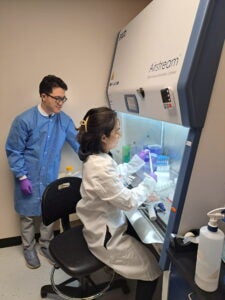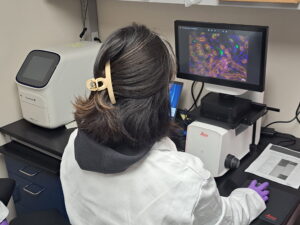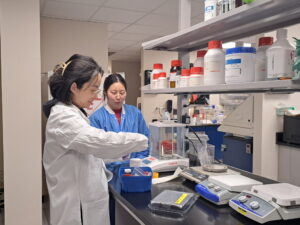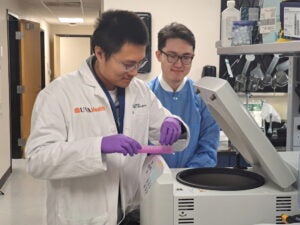Basic Science Research Program – Xin Li, PhD
 Dr. Xin Li earned her PhD in Integrative Physiology at Rutgers University in 2006. She has an outstanding background in research, with a focus on metabolism and inflammation. Her work has earned significant recognition, reflected in impactful publications and awards. Prior to joining the University of Virginia, Dr. Li led a dynamic research team at the New York University and engaged in collaborations with both national and international researchers, advancing the field through innovative discoveries.
Dr. Xin Li earned her PhD in Integrative Physiology at Rutgers University in 2006. She has an outstanding background in research, with a focus on metabolism and inflammation. Her work has earned significant recognition, reflected in impactful publications and awards. Prior to joining the University of Virginia, Dr. Li led a dynamic research team at the New York University and engaged in collaborations with both national and international researchers, advancing the field through innovative discoveries.
At UVA, Dr. Li continues to explore the multifaceted role of succinate signaling in health and disease. Her research remains at the cutting edge of understanding complex biological processes and their potential for therapeutic development. Her efforts are pivotal in unraveling the intricate mechanisms of succinate in various physiological and pathological contexts.
Her efforts are pivotal in unraveling the intricate mechanisms of succinate in various physiological and pathological contexts.
Current Research:
Succinate as a Metabolite and Signaling Molecule: Implications for Aging and Disease

Succinate, a central metabolite in the tricarboxylic acid (TCA) cycle, has emerged as a significant signaling molecule through its activation of the succinate receptor SUCNR1 (GPR91). This receptor is involved in a range of physiological and pathological processes, including inflammation, immune responses, and metabolic regulation.
Key Areas of Research:
Inflammation and Aging: Inflammaging, characterized by chronic low-grade inflammation during aging, may be influenced by succinate’s role in activating inflammatory pathways. Succinate may also amplify the inflammatory response in the brain through microglial and astrocyte activation. Understanding how succinate contributes to this process could reveal new approaches for managing age-related inflammation. Funding resource: R01AG068857, R21AG055787, R01AG080696.
Succinate, periodontitis, and systemic health: Periodontitis is associated with an increased risk of cardiovascular diseases. There is a bidirectional relationship between diabetes and periodontitis. In addition, chronic periodontal inflammation has been linked to conditions such as respiratory diseases, rheumatoid arthritis, and even Alzheimer’s disease. The systemic effects of succinate-mediated inflammation might play a role in these associations. It is an important area of research that explores how oral inflammation and metabolic signaling intersect with broader health outcomes. Funding resource: R01DE027074, R01AG080696, R41DE028212, R42DE028212.
health: Periodontitis is associated with an increased risk of cardiovascular diseases. There is a bidirectional relationship between diabetes and periodontitis. In addition, chronic periodontal inflammation has been linked to conditions such as respiratory diseases, rheumatoid arthritis, and even Alzheimer’s disease. The systemic effects of succinate-mediated inflammation might play a role in these associations. It is an important area of research that explores how oral inflammation and metabolic signaling intersect with broader health outcomes. Funding resource: R01DE027074, R01AG080696, R41DE028212, R42DE028212.
 Succinate’s role in cancer microenvironment: As a metabolite produced and utilized by both microbiota and mammalian cells, succinate plays a central role in tumor metabolism, immune responses, and cancer progression. Succinate levels are elevated in oral cancer and pancreatic cancer. This accumulation can influence tumor growth and behavior through direct and indirect influences on microbiota and host responses. SUCNR1 activation can enhance the production of pro-inflammatory cytokines and immune modulatory factors. This inflammatory environment can support tumor progression and enable cancer cells to evade immune surveillance. Funding resource: W81XWH-19-1-0603.
Succinate’s role in cancer microenvironment: As a metabolite produced and utilized by both microbiota and mammalian cells, succinate plays a central role in tumor metabolism, immune responses, and cancer progression. Succinate levels are elevated in oral cancer and pancreatic cancer. This accumulation can influence tumor growth and behavior through direct and indirect influences on microbiota and host responses. SUCNR1 activation can enhance the production of pro-inflammatory cytokines and immune modulatory factors. This inflammatory environment can support tumor progression and enable cancer cells to evade immune surveillance. Funding resource: W81XWH-19-1-0603.
Representative Publications (* corresponding author):
- Wang Z, Saxena A, Yan W, Uriarte SM, Siqueira R, Xin Li*. The impact of aging on neutrophil functions and the contribution to periodontitis. Int J Oral Sci. 2025 Jan 16;17(1):10. doi: 10.1038/s41368-024-00332-w. Review. PubMed PMID: 39819982; PubMed Central PMCID: PMC11739572.
- Scott C. Thomas†, Yuqi Guo†, Fangxi Xu, Deepak Saxena*, Xin Li*. (2023). A novel SUCNR1 inhibitor alleviates dysbiosis through inhibition of host responses without direct interaction with host microbiota. Molecular Oral Microbiology, 00, 1–11. https://doi.org/10.1111/omi.12431. (Wiley Top 10 Article 2022-2023)
- Yuqi Guo, Jianlu Wei, Chuanju Liu, Xin Li*, Wenbo Yan*. (2023) Metformin regulates bone marrow stromal cells to accelerate bone healing in diabetic mice. eLife 12:e88310. https://doi.org/10.7554/eLife.88310
- Xin Li and Deepak Saxena*. Tumor Mycobiome: Paradigm shift in cancer pathogenesis. Cell Volume 185, Issue 20, 29 September 2022, Pages 3648-3651
- Yuqi Guo†, Fangxi Xu†, Scott C. Thomas, Yanli Zhang, Bidisha Paul, Satish Sakilam, Sungpil Chae, Patty Li, Caleb Almeter, Angela R. Kamer, Paramjit Arora, Dana T. Graves, Deepak Saxena*, Xin Li*. Targeting the Succinate Receptor Effectively Inhibits Periodontitis. Cell Reports 40, 111389, September 20, 2022. † Equal contribution. PMID: 36130514 PMCID: PMC9533417
- Xin Li*, Kiprowska, M., Kansara, T., Kansara, P. & Li, P. Neuroinflammation: A Distal Consequence of Periodontitis. Journal of Dental Research, Jun 16, 2022. PMID: 35708472
- Xin Li and Deepak Saxena*. The mycobiome-immune axis: The next frontier in pancreatic cancer. Cancer Cell. 2022 Feb 14;40(2):120-122. doi: 10.1016/j.ccell.2022.01.009. PubMed PMID: 35167821.
- Sri Nitya Reddy Induri, Payalben Kansara, Scott Thomas, Fangxi Xu, Deepak Saxena and Xin Li*. The gut microbiome, metformin, and aging. Annual Review Pharmacology and Toxicology 2021 Aug 24. doi: 10.1146/annurev-pharmtox-051920-093829. PMID: 34449247.
- Wang L, Zhang Y, Kiprowska M, Guo Y, Yamamoto K, Xin Li*. Diethyl Succinate Modulates Microglial Polarization and Activation by Reducing Mitochondrial Fission and Cellular ROS. Metabolites. 2021; 11(12):854.
- Wenbo Yan, Yuqi Guo, Fangxi Xu, Deepak Saxena, Xin Li*. Identification of differentially methylated regions associated with knockout of SUV39H1 in prostate cancer cells. Genes 2020, 11(10), 1188; https://doi.org/10.3390/genes11101188.
- Yuqi Guo, Sun Wook Cho, Deepak Saxena, Xin Li*. Multifaceted Actions of Succinate as a Signaling Transmitter Vary with Its Cellular Locations. Endocrinology and Metabolism (Seoul) 2020 Mar;35(1):36-43. PMID: 32207262 PMCID: PMC7090288
- Yang J, Guo Y, Seo W, Zhang R, Lu C, Wang Y, Luo L, Paul B, Yan W, Saxena D, Xin Li*. Targeting cellular metabolism to reduce head and neck cancer growth. Scientific Reports March 21, 2019. PMID: 30899051; PMCID: PMC6428890
- Yang J, Guo Y, Lu C, Zhang R, Wang Y, Luo L, Zhang Y, Chu CH, Wang KJ, Obbad S, Yan W, Xin Li *. Inhibition of Karyopherin beta 1 suppresses prostate cancer growth. Oncogene 38, pages4700–4714(2019). PMID: 30742095 PMCID: PMC6565446
- Yuqi Guo, Chengzhi Xie, Xiyan Li, Jian Yang, Tao Yu, Ruohan Zhang, Tianqing Zhang, Deepak Saxena, Michael Snyder, Yingjie Wu and Xin Li*. Succinate and its G-protein-coupled receptor stimulates osteoclastogenesis. Nature Communications; 8:15621. 2017
- Yang J, Lu C, Wei J, Guo Y, Liu W, Luo L, Fisch G and Xin Li *. Inhibition of KPNA4 attenuates prostate cancer metastasis. Oncogene 2017; 36(20):2868-2878
Future Directions:
Ongoing research aims to elucidate the precise mechanisms by which succinate and SUCNR1 influence various cell types and organs. Continued exploration is essential to fully understand their roles and to harness this knowledge for potential therapeutic applications.
